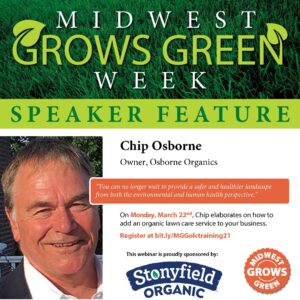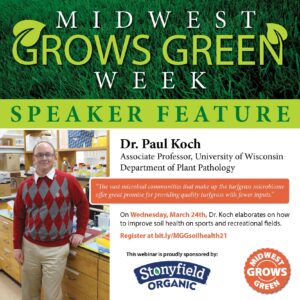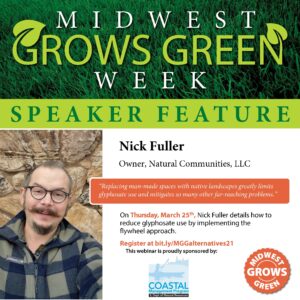Hear why you should attend MGG Week webinars from our speakers!
Midwest Grows Green (MGG) Week webinars feature 15+ different speakers. So, we asked them why they will participate in this series of educational webinars. Here are their responses:
March 22nd’s “Adding an Organic Lawn Care Service to Your Business” Webinar, RSVP at bit.ly/MGGolctraining21:
 Chip Osborne, Osborne Organics: “You can no longer wait to provide a safer and healthier landscape from both the environmental and human health perspective.”
Chip Osborne, Osborne Organics: “You can no longer wait to provide a safer and healthier landscape from both the environmental and human health perspective.”
Shay Lunseth, Organic Lawns by LUNSETH: “Organic lawn care achieves healthy soil that better absorbs and retains water for the grass to intake and use appropriately.”
Alec McClennan, Good Nature Organic Lawn Care: “People need a way to care for their yard that they feel comfortable with and satisfies their aesthetic and environmental needs.”
Austin Hall, Greenwise Organic Lawn Care: Greenwise believes providing organic lawn care is important to keep our customers, their pets and our environment safe from any dangerous pesticides or chemicals.
March 24th’s “Improving Soil Health on Sports and Recreational Fields” Webinar, RSVP at bit.ly/MGGsoilhealth21:
 Dr. Paul Koch, University of Wisconsin: “The vast microbial communities that make up the turfgrass microbiome offer great promise for providing quality turfgrass with fewer inputs.”
Dr. Paul Koch, University of Wisconsin: “The vast microbial communities that make up the turfgrass microbiome offer great promise for providing quality turfgrass with fewer inputs.”
Dan Dinelli, North Shore Country Club: “Maintaining healthy soil and turfgrass systems brings together the physical, chemical and biological components.”
Benjamin Krumstok, Illinois Food Scrap Coalition: “Healthy soil improves turf performance by reducing compaction, player injuries, flooding, maintenance and, most importantly, chemical exposure.”
Vytas Pabedinskas, Save Our Soil, LLC.: “Healthy soil is a dynamic system that needs its engine, the microbiology, to be fueled, lubricated and shock absorbed by organic matter to handle the stresses put on athletic fields.”
Scott Tess, City of Urbana: “Utilizing compost for sports fields is a great way to support high performance turf while recycling nitrogen and phosphorus from landscape trimmings.”
March 25th’s “Viable and Safe Alternatives to Glyphosate” Webinar, RSVP at bit.ly/MGGalternatives21:
 Nick Fuller, Natural Communities, LLC: “Replacing man-made spaces with native landscapes greatly limits glyphosate use and mitigates so many other far-reaching problems.”
Nick Fuller, Natural Communities, LLC: “Replacing man-made spaces with native landscapes greatly limits glyphosate use and mitigates so many other far-reaching problems.”
Dr. Janice Gilbert, Invasive Phragmites Control Centre: “We can effectively manage invasive Phragmites with a detailed and site-specific plan to guide short, intermediate and long-term control needs.”
Lynn Short, Humber College: “An engaged and well-managed community of concerned volunteers can effectively manage Phragmites and other invasive plants through monitoring and manual removal techniques.”
Dan MacSwain, Washington County, MN: “We can reduce our reliance on glyphosate by challenging ourselves and organizations to continue asking why it is being used and embracing IPM to inspire change.”
Laurie Schneider, Pollinator Friendly Alliance: “We need to change the conversation to make environmental impacts, conserving wild areas and at-risk species the #1 priority.”
We hope you can attend our MGG Week Webinars March 22nd-26th, 2021. If you have questions, please contact Ryan Anderson at randerson@ipminstitute.org.
